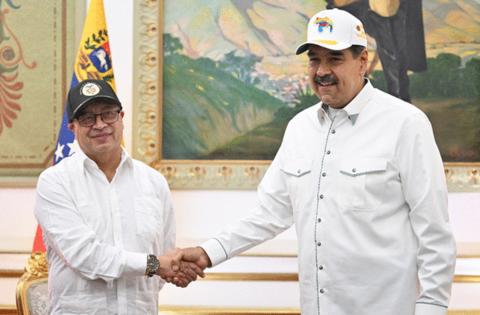Colombia backs idea of Maduro leaving power, avoiding jail
Published in News & Features
Colombia said it would favor a path for Venezuelan President Nicolás Maduro to hand over power to a transition government tasked with organizing new elections — preferring the idea over the alternative of a more forceful U.S. intervention in its neighbor’s affairs.
The transition proposal has been making the rounds in diplomatic circles in Washington, Caracas and beyond as a potential solution to the U.S. standoff with Venezuela, while President Donald Trump amasses warships in the Caribbean. There’s no sign that Trump would be open to such an arrangement.
But Maduro might consent to the idea if guaranteed that he would be safe from persecution, Colombia’s Foreign Affairs Minister Rosa Villavicencio said Wednesday in an interview in Madrid.
“Maduro would be inclined to accept it,” Villavicencio said. “He could leave without necessarily ending up in prison, someone else could come in to lead that transition and allow for elections that are legitimate.”
Maduro hasn’t said anything in public that indicates he would consider the proposal. Villavicencio said her boss, Colombian President Gustavo Petro, hasn’t talked to Maduro directly, but that her team is in contact with Venezuela’s diplomats.
Venezuela’s information ministry didn’t immediately reply to a request for comments. A White House official said no U.S. negotiations with Venezuela are currently occurring.
In a public statement issued later on Wednesday, Colombia’s Foreign Ministry called Villavicencio’s remarks “decontextualized information published in the media.” Petro’s government, it added, “respects the sovereignty of the sister nation of Venezuela.”
Dollar bonds from Venezuela and its state-oil company rose across the curve. Notes due in 2034 jumped 2 cents to 33 cents on the dollar, the highest in six years, according to indicative pricing data collected by Bloomberg.
Petro and Brazilian President Luiz Inácio Lula da Silva have called for new Venezuelan elections after the 2024 vote was widely condemned as fraudulent. A safe exit plan for Maduro could now be “the healthiest option” but would require backing from the Venezuelan opposition, Villavicencio said.
Officials in Colombia, a longtime U.S. ally that shares a border with Venezuela, have until now spoken only broadly of avoiding conflict without offering specific solutions.
Earlier this week, Trump threatened to target suspected drug cartel targets on land in Venezuela, Colombia and Mexico. Since September, U.S. forces have been blowing up alleged drug-running boats in the Caribbean and Pacific, killing more than 80 people.
Colombia has warned that a U.S. attack on Venezuela could trigger another exodus of migrants. About 8 million Venezuelans have fled their country over the last decade, and nearly three million of them live in Colombia, according to the U.N. High Commissioner for Refugees.
“An intervention could trigger a humanitarian crisis that would be very difficult to manage,” Villavicencio said.
Since August, the U.S. has deployed warships and aircraft to the southern Caribbean, stoking fears of an attack on Venezuelan soil.
Bogota was until recently a strong ally of Washington, but relations have soured badly since the start of Trump’s second term. The U.S. leader has called Petro a “lunatic” and an “illegal drug leader,” slashed aid and revoked his visa. Villavicencio said she would renounce her visa in solidarity with Petro.
The tension between Colombia and the U.S. may make Petro’s government a poor interlocutor on Venezuela’s behalf, Sergio Guzman, director of Colombia Risk Analysis, said in a phone interview.
“The government’s support for a plan for Maduro’s negotiated exit is proof of the failure of all its foreign policy tools,” Guzman said. “Colombia lacks credibility both domestically and internationally to be a guarantor country for any transition process in Venezuela.”
-------
—With assistance from Oscar Medina, Maria Elena Vizcaino and Eric Martin.
©2025 Bloomberg L.P. Visit bloomberg.com. Distributed by Tribune Content Agency, LLC.







Comments